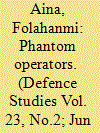|
|
|
Sort Order |
|
|
|
Items / Page
|
|
|
|
|
|
|
| Srl | Item |
| 1 |
ID:
190441


|
|
|
|
|
| Summary/Abstract |
Across the world, Special Operations Forces (SOFs) play a leading role in asymmetric warfare. The unique trainings, skills, weapons, and equipment of these elite Tier 1 operators, differentiates them from conventional forces, making them the preferred choice in complex environments. SOFs are ideally deployed for short operations, which include direct action missions, hostage rescue, hunting high-value targets (HVTs), mobility operations, intelligence operations, airborne operations, counterterrorism (CT), counterinsurgency (COIN) operations, and covert operations among others. While the literature has mostly focused on the utility of major powers’ SOFs in the Global War on Terror (GWOT), with little attention on Africa’s SOF’s, this paper examines the origins, evolution, composition, and deployments of Nigeria’s SOFs specifically in the Northeast, Northcentral, and Northwest theatres of operation, against the Boko Haram insurgency and armed banditry, respectively. Drawing on primary data from interviews with key informants and other secondary data sources, the paper interrogates the successes, challenges, and prospects of Nigeria’s SOFs. The strategic utility and overreliance on Nigeria’s SOFs by political leaders and the Military’s High Command puts a strain on their strategic value which potentially undermines their strategic efficacy as a force-multiplier in the long run, against unconventional threats.
|
|
|
|
|
|
|
|
|
|
|
|
|
|
|
|
|
|
|
|
|